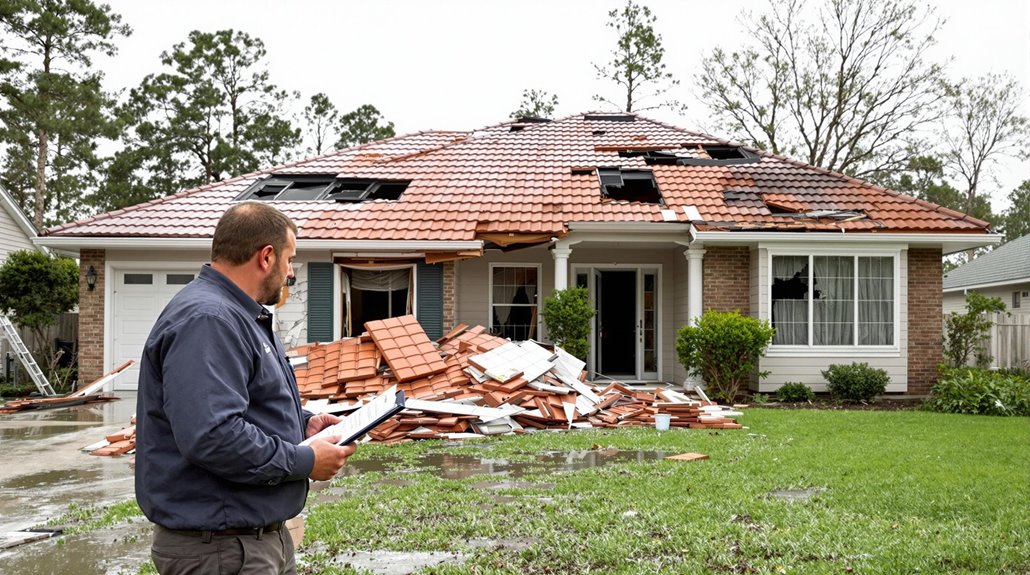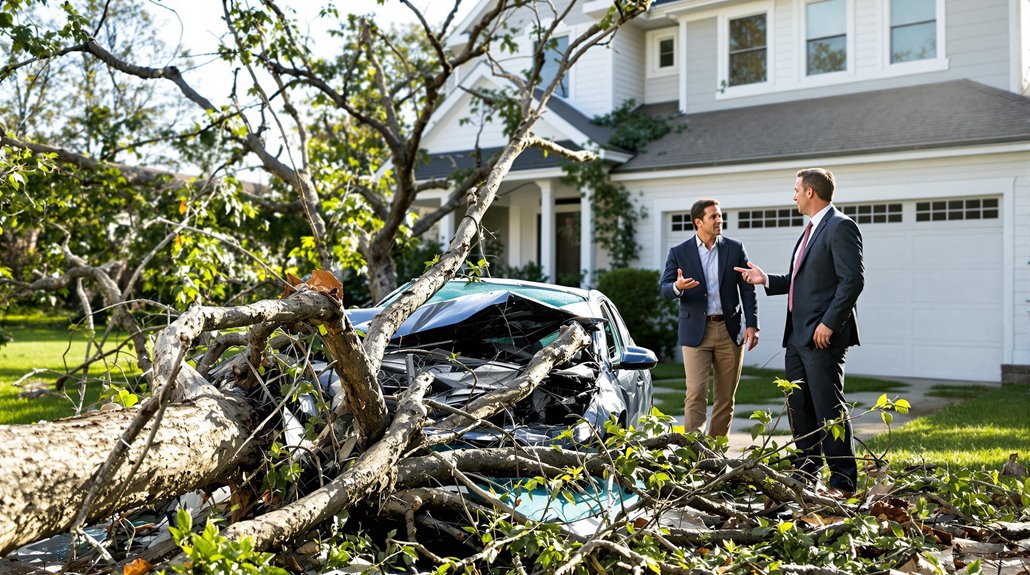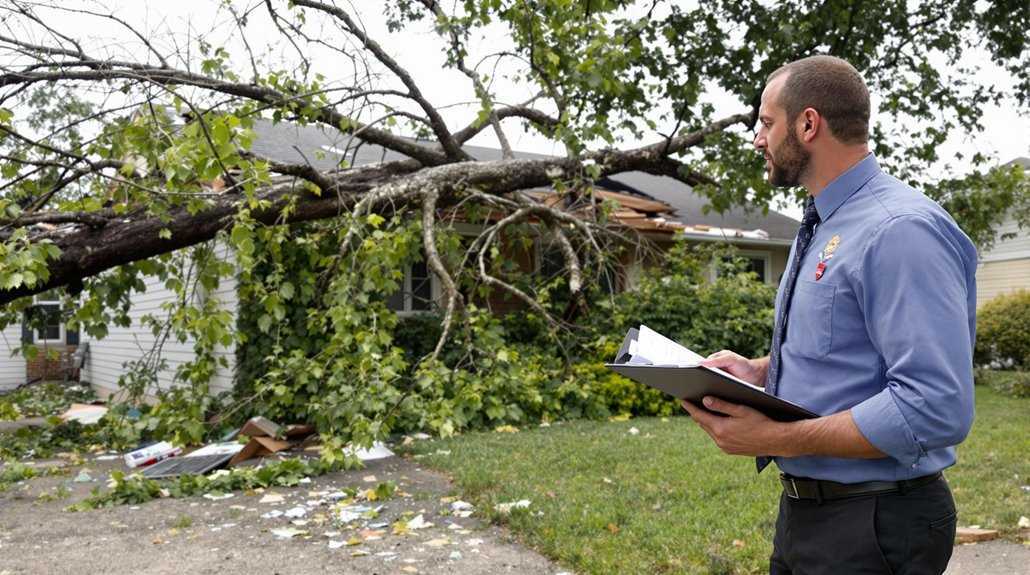Property damage is the intentional or unintentional harm or destruction of another person's tangible assets, such as real estate, vehicles, or personal belongings. This can result in financial losses and potential legal consequences. Various types of property damage claims exist, including residential, commercial, motor vehicle, and personal property claims. Understanding the specifics of property damage claims is vital for guiding insurance coverage and potential losses, and further exploration of this topic can provide valuable insights.
Key Takeaways
- Property damage occurs when someone intentionally or unintentionally damages or destroys another person's property.
- Types of property damage include residential, commercial, motor vehicle, and personal property damage.
- Intentional property damage can be a felony or misdemeanor, depending on the severity of the damage and jurisdictional laws.
- Liability for property damage typically relies on negligence principles, and documentation is essential for claims.
- Property owners can file claims with insurance companies and hire public adjusters to advocate for fair compensation.
Types of Property Damage Claims
The domain of property damage claims encompasses various types, each with distinct characteristics and considerations. Property damage claims can be categorized into residential, commercial, motor vehicle, and personal property damage claims.
Residential property damage claims involve damage to homes and personal property due to causes such as natural disasters, fire damage, and vandalism claims. Homeowner's insurance policies typically cover these types of damages, which may include specific perils like theft coverage.
Commercial property damage claims, on the other hand, relate to damage to business properties and assets, including damage from fires, theft, and natural disasters.
Motor vehicle damage claims involve damage to vehicles resulting from accidents or intentional acts, while personal property damage claims pertain to damage to personal belongings.
Understanding the different types of property damage claims is essential for individuals and businesses to navigate the complexities of insurance coverage and guarantee adequate protection against potential losses. Public adjusters can assist property owners in understanding their policies and managing claims effectively.
How to File a Claim for Damaged Property

Filing a claim for damaged property involves several key steps, starting with thoroughly documenting the damage to establish a clear record of the incident.
This documentation is essential in determining the claim value, as it provides evidence of the extent of the damage and supports the claimant's request for compensation.
A well-prepared claim submission, accompanied by detailed documentation, helps guarantee a smooth and efficient processing of the claim.
Working with public adjusters can increase insurance claim settlements by 30-50% compared to filing independently.
Documenting Property Damage
When property damage occurs, thoroughly documenting the extent of the damage is essential to filing a successful insurance claim. This documentation serves as a crucial record of the property condition and facilitates a thorough damage evaluation.
Working with public insurance adjusters can increase property damage claim settlements by 30-50% through professional documentation assistance.
Effective documentation involves:
- Photographic evidence: capturing high-quality, dated images of the damage from multiple angles, including wide shots and close-ups.
- Video documentation: recording detailed videos of the damage, highlighting safety concerns and areas requiring urgent repairs.
- Written records and inventory: maintaining detailed written records of the damage, including witness statements, and keeping an inventory of damaged items.
- Professional assessments and organization: engaging experts to assess the damage, obtaining detailed reports, and storing all documents in a secure and accessible location.
Determining Claim Value
Accurate documentation of property damage provides the foundation for a subsequent step in the claims process: determining claim value.
A thorough claim assessment involves evaluating the type of property, extent of damage, and policy limits. Damage evaluation considers the cost of repair or replacement, diminution in fair market value, and any residual diminution in value after repairs.
Insurance policies may specify whether property is insured on a replacement cost or actual cash value basis, affecting claim value calculations. Factors such as depreciation, policy deductibles, and special or unique value to the property can also impact claim value.
A detailed evaluation of these factors enables a fair and accurate determination of claim value, facilitating a successful claims process.
Public adjusters can help property owners maximize their claim settlements by professionally reviewing documentation and negotiating with insurance companies.
Submitting a Claim
The aftermath of property damage is often marked by uncertainty and a sense of urgency.
To navigate this complex process, understanding the steps involved in submitting a claim is essential. Claim submission requires meticulous attention to detail and thorough insurance documentation.
Key considerations for submitting a claim include:
- Notifying the insurance company promptly to initiate the process
- Providing necessary information, such as policy number and damage description
- Documenting everything, including photographs and videos of the damage
- Saving receipts for temporary repairs and living arrangements to substantiate the claim
An insurance adjuster will conduct a damage assessment inspection to validate your claim and determine coverage amounts based on policy terms.
Civil Lawsuits for Property Damage

Civil lawsuits for property damage often arise from disputes over financial compensation for harm caused to personal or real property. These lawsuits can involve various types of damage, including harm caused by negligence, willful destruction, or acts of nature. Having thorough damage documentation is essential for supporting property damage claims and strengthening the legal case.
| Negligence Criteria | Compensation Limits | Evidence Required |
|---|---|---|
| Carelessness or unreasonable behavior | Cost of repairing or replacing damaged property | Photographs, repair estimates, witness statements |
| Failure to act reasonably to prevent harm | Value of damaged property | Expert testimony, forensic analysis |
| Breach of duty to protect others' property | Compensation for loss of use or enjoyment | Documentation of lost income or expenses |
In civil lawsuits for property damage, plaintiffs must prove that the defendant's actions or omissions met the negligence criteria, resulting in harm to their property. The court may award compensatory damages within established compensation limits, based on the evidence presented.
Legal Penalties for Intentional Property Damage

Legal penalties for intentional property damage vary in severity, with felony charges typically applying to damages exceeding a certain monetary threshold, such as $1,000 or $50,000.
Corresponding penalties can include significant prison time, ranging from two to 15 years, in addition to substantial fines.
In contrast, misdemeanor offense consequences for damage valued below a certain threshold, such as $1,000, may include jail time of up to six months.
Felony Charges and Penalties
Multiple factors contribute to the determination of felony charges and penalties for intentional property damage, including the severity of the damage and the specific laws of the local jurisdiction. Serious offenses, such as arson or large-scale destruction, are typically charged as felonies.
The implications of felony vandalism charges can be severe:
- Prison sentences can range from 1 to 15 years for aggravated property damage.
- Fines can be substantial, up to $10,000 or more, depending on the jurisdiction.
Aggravated damage defenses often rely on proving lack of intent or pre-existing damage.
Effective legal defense is essential to reduce charges or achieve a favorable outcome, highlighting the importance of experienced criminal defense attorneys in steering through complex felony property damage cases.
Misdemeanor Offense Consequences
Typically, the consequences of misdemeanor property damage offenses are determined by the classification of the crime, which is often based on the monetary value of the damage.
For instance, Class B misdemeanors cover damages under $500, while Class A misdemeanors cover damages between $500 and $1,500. The classification may lead to varying penalties, including jail time, fines, and restitution.
Property damage liability may arise from negligent property destruction, but intent and willfulness are key factors in determining malicious damage. Courts may order restitution in addition to fines and jail time.
The nature of the property damaged can also affect sentencing, and specific sentencing guidelines are outlined in state and federal laws.
Repeat offenses can lead to harsher penalties.
What to Expect in a Property Damage Case

How does one navigate the complex process of a property damage case? It begins with understanding the legal basis for property damage claims, which typically hinge on negligence principles.
If the person responsible has insurance coverage, claims are usually made against their policy. In determining liability, a reasonable care standard is applied, where the actions of the individual or entity are compared to those of a reasonable person under similar circumstances.
Key steps in a property damage case include:
- Evaluating and documenting the damage to determine the scope of the claim
- Collecting evidence, such as photographs and witness statements
- Determining liability and notifying the responsible party
- Working with insurance companies to provide evidence and support the claim
Throughout the process, it is essential to keep detailed records and act promptly to avoid forfeiting the right to claim.
Understanding local laws and seeking professional help can greatly impact the outcome of the case.
A claims adjuster's evaluation typically requires 30-60 days to determine the final settlement amount for property damage.
Evaluating Damages: Calculating the Value of Property Damage

One of the vital components in resolving a property damage case involves estimating damages and accurately calculating the value of the property damage incurred. This process requires the use of alternative valuation methods, such as the market approach, cost approach, income approach, and sales comparison approach.
The choice of method depends on the type of property, location, and extent of damage. Impact evaluation techniques, including analyzing market trends, property condition, and buyer perception, are also important in determining the decrease in market value.
Estimating damages also involves considering various factors that affect property value, such as location, condition, and type of damage. The immediate impact of damage on market value, long-term effects, and insurability must also be evaluated.
Accurate evaluation of damages is vital to guarantee fair compensation. However, challenges in estimating property damage arise, including determining market value, evaluating the extent of damage, and selecting the appropriate valuation method.
Working with public adjusters can increase property damage settlements by 20-50% through their expertise in comprehensive damage assessment and negotiation with insurance companies.
Working With an Attorney to Resolve a Property Damage Claim

After estimating damages and calculating the value of property damage, resolving a property damage claim often requires the expertise of an attorney.
An attorney consultation can provide guidance on managing the claims process and guarantee that the claimant's rights are protected. In the event of a disputed claim, an attorney can engage in claims negotiation with the insurance company to reach a fair settlement.
Benefits of working with an attorney include:
- Protection against bad-faith insurance tactics, such as rushed evaluations or low settlement offers
- Expert handling of all communications with the insurance company
- Guaranteeing that all necessary documentation is provided to support the claim
- Guidance on potential outcomes and legal strategies to achieve a favorable settlement
While attorneys typically charge 30-40% contingency fees, this arrangement means no upfront costs for property damage claimants seeking legal representation.
The Benefits Of Consulting A Public Adjuster

Consulting a public adjuster can offer several key benefits to policyholders traversing the complexities of property damage claims.
By leveraging their expertise in insurance claims, public adjusters provide an objective assessment of damages, helping to guarantee accurate claim estimation and thorough documentation.
This in turn can streamline the claim process and ultimately lead to higher claim payouts and settlements for policyholders.
Studies have shown that property damage claims handled by professional public adjusters result in settlements up to 800% higher than those without adjuster representation.
Expertise In Insurance Claims
Numerous complexities are inherent in the insurance claims process, making it a challenging task for policyholders to navigate alone. A public adjuster's expertise in insurance claims can be invaluable in such situations. Their knowledge of insurance policies and procedures enables them to accurately interpret policy details, identify benefits, and navigate the claims process effectively.
Some key benefits of a public adjuster's expertise include:
- In-depth knowledge of insurance policies and procedures to guarantee accurate interpretation and maximum benefits
- Skilled negotiation and advocacy to counter insurance company tactics and secure fair settlements
- Assistance with documentation and paperwork to guarantee thorough and accurate claims presentation
- Ability to identify and clarify complex policy language to ensure policyholders understand their rights and obligations
Objective Damage Assessment
The expertise of a public adjuster is particularly valuable when evaluating property damage.
Conducting a thorough damage identification process, they utilize specialized tools, such as moisture meters and infrared cameras, to document damage and identify hidden issues. This meticulous approach enables an objective assessment of the damage, which is essential for accurate loss estimation and liability determination.
A public adjuster's objective damage evaluation provides an extensive report outlining damages, estimated costs, and recommendations for avoiding future damages.
By leveraging their expertise, property owners can guarantee accurate damage assessments, preventing underreporting of damages and supporting claims with evidence.
The result is a clear understanding of the damage and associated costs, facilitating informed decision-making throughout the claim process.
Streamlined Claim Process
Efficiency is paramount in the aftermath of property damage, as delays in the claim process can exacerbate losses and amplify stress for property owners.
A streamlined claim process is essential to minimize downtime and guarantee a swift recovery.
The benefits of a streamlined claim process include:
- Quick documentation through centralized software solutions and inspections
- Reduced delays through extensive claims packages and virtual collaboration platforms
- Enhanced communication between policyholders and claims adjusters via virtual claims processing tools
- Increased efficiency through remote claims assessment apps and automated processing
Higher Claim Payouts & Settlements
When maneuvering the complex process of filing an insurance claim, property owners often benefit from consulting a public adjuster to maximize their settlement.
Public adjusters bring expertise in evaluating damage, knowledge of insurance policies, and skilled negotiation to secure fair settlements. By accurately identifying all damages and ensuring all entitled benefits are claimed, public adjusters can lead to higher payouts.
In fact, studies show that hiring a public adjuster can result in average settlements of $22,266 compared to $18,659 without one. Their contingency fees, typically a percentage of the claim payout, motivate public adjusters to secure higher settlements.
About The Public Claims Adjusters Network (PCAN)

A vital component in the insurance claims process, Public Claims Adjusters Network (PCAN) serves as a trusted intermediary between policyholders and insurance companies.
PCAN's primary function is to assist policyholders in maneuvering through insurance claims by providing expert adjusters to handle claims efficiently. This approach guarantees quality and responsiveness throughout the claims process.
Benefits of utilizing PCAN's services include:
- Providing independent adjusters to guarantee impartial claims handling
- Facilitating prompt and professional communication with policyholders
- Offering specialized expertise for complex and catastrophic claims
- Helping to maximize claim payouts for policyholders through claims optimization
Public adjusters at PCAN work to optimize outcomes for policyholders. With a proven track record of improving claims handling efficiency, PCAN sets new standards for claims management.
References
- https://www.cochranfirm.com/property-damage-claims/
- https://malegislature.gov/laws/generallaws/partiv/titlei/chapter266/section127
- https://files.znu.edu.ua/files/Bibliobooks/Inshi77/0057184.pdf
- https://www.brannoncanhelp.com/personal-injury-resources/property-damage/
- https://www.dellisonlaw.com/massachusetts-willful-or-malicious-destruction-of-property-lawyer/
- https://www.askadamskutner.com/premises-liability/property-damage-claims/
- https://www.piccmiami.com/types-of-property-damage-claims
- https://dl.icdst.org/pdfs/files4/e1f57bc9ede07bcfc447d7d5f97b71ea.pdf
- https://www.haffnerlawyers.com/four-common-types-of-property-damage-claims/
- https://www.cbtrial.com/how-to-make-a-property-damage-claim/








